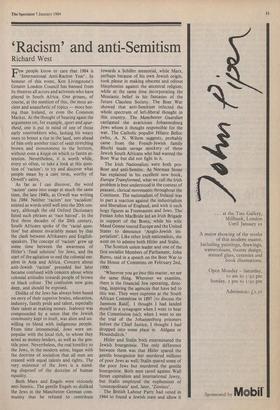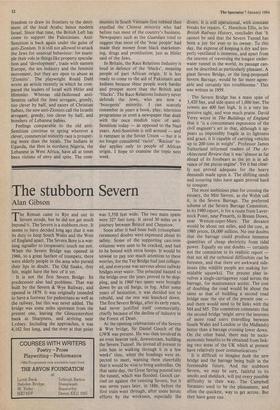`Racism' and anti-Semitism
Richard West
Fewpeople know or care that 1984 is `International Anti-Racism Year'. In honour of this event, Ken Livingstone's Greater London Council has banned from its theatres all actors and actresses who have played in South Africa. One groans, of course, at the mention of this, the most an- cient and anaesthetic of topics — more bor- ing than Ireland, or even the Common Market. At the thought of hearing again the arguments on, for example, sport and apar- theid, one is put in mind of one of those early voortrekkers who, lashing his weary oxen to breast a rise in the land, sees ahead of him only another tract of veldt stretching brown and monotonous to the horizon, without even a kopje on which to fasten at- tention. Nevertheless, it is worth while, every so often, to take a look at this ques- tion of `racism'; to try and discover what people mean by a cant term, worthy of Orwell's satire.
As far as I can discover, the word 'racism' came into usage at much the same time, the late 1940s, as Orwell was writing his 1984. Neither 'racism' nor 'racialism' existed as words until well into the 20th cen- tury, although the old Oxford Dictionary listed such phrases as 'race hatred'. In the first three decades of the 20th century, South Africans spoke of the 'racial ques- tion' but almost invariably meant by that the clash between Afrikaners and English- speakers. The concept of 'racism' grew up some time between the awareness of Hitler's 'final solution' for Jews, and the start of the agitation to end the colonial em- pires in Asia and Africa. Concern about anit-Jewish 'racism' preceded but later became confused with concern about white colonial attitudes towards people of brown or black colour. The confusion now goes deep, and should be exposed.
Dislike of the Jews has always been based on envy of their superior brains, education, industry, family pride and talent, especially their talent at making money. Jealousy was compounded by a sense that the Jewish community kept to itself, was alien and un- willing to blend with indigenous people. From time immemorial, Jews were un- popular with the local rich, to whom they acted as money-lenders, as well as the gen- title poor. Nevertheless, the real hostility to the Jews, in the modern sense, began with the doctrine of socialism that all men are created with equal talents and rights. The very existence of the Jews is a stand- ing disproof of the doctrine of human equality.
Both Marx and Engels were viciously anti-Semitic. The gentile Engels so disliked the Jews in the Manchester German com- munity that he refused to contribute
towards a Schiller memorial, while Marx, perhaps because of his own Jewish origin, took please in making obscene and odious blasphemies against the ancestral religion; while at the same time incorporating the Messianic belief in his fantasies of the future Classless Society. The Boer War showed that anti-Semitism infected the whole spectrum of left-liberal thought in this country. The Manchester Guardian castigated the avaricious Johannesburg Jews whom it thought responsible for the war. The Catholic populist Hilaire Belloc (who, A. N. Wilson suggests, probably came from the French-Jewish family Bloch) made savage mockery of those Jewish South Africans who had wanted the Boer War but did not fight in it.
The Irish Nationalists were both pro- Boer and anti-Semitic. As Norman Stone has explained in his excellent new book, Europe Transformed, what we call the Irish problem is best understood in the context of peasant, clerical movements throughout the Continent. The nationalism of Ireland was in part a reaction against the industrialism and liberalism of England, and with it such bogy figures as Freemasons and Jews. The Fenian John MacI3ride led an Irish Brigade in support of the Boers, while his wife Maud Gonne toured Europe and the United States to denounce 'Anglo-Jewish im- perialism'. Like other Irish nationalists, she went on to admire both Hitler and Stalin.
The Scottish union leader and one of the first socialist Members of Parliament, John Burns, said in a speech on the Boer War to the House of Commons on February 2nd, 1900: 'Wherever you go into this matter, we see the same thing. Wherever we examine, there is the financial Jew operating, direc- ting, inspiring the agencies that have led to this war. They were supreme at the South African Committee in 1897 [to discuss the Jameson Raid]. I thought I had landed myself in a synagogue when I went to hear the Commission (sic); when I went to see the trial of the Johannesburg prisoners before the Chief Justice, I thought I had dropped into some place in Aldgate or Houndsditch.'
Hitler and Stalin both exterminated the Jewish bourgeoisie. The only difference between them was that Hitler spared the gentile bourgeoisie but murdered millions of poor Jews as well; Stalin spared some of the poor Jews but murdered the gentile bourgeoisie. Both men raved against Wall Street capitalism and international Jewry, but Stalin employed the euphemism of 'cosmopolitans' and, later, 'Zionists'..
The British Labour Party had voted in 1944 to found a Jewish state and allow it freedom to draw its frontiers to the detri- ment of the local Arabs; hence modern Israel. Since that time, the British Left has come to support the Palestinians. Anti- Semitism is back again under the guise of anti-Zionism. It is still not allowed to attack the Jews for unsocial behaviour: for exam- ple their role in things like property specula- tion and 'development', trade with eastern Europe, the sex industry and the feminist movement, but they are open to abuse as 'Zionists'. The playwright Roald Dahl wrote an article recently in which he com- pared the leaders of Israel with Hitler and Himmler. Whereas old-fashioned anti- Semites called the Jews arrogant, greedy, too clever by half, and eaters of Christian babies, the new anti-Zionists call the Israelis arrogant, greedy, too clever by half, and bombers of Lebanese babies.
Feelings comparable to the old anti- Semitism continue to spring wherever a clever, commercial minority race is prosper- ing more than the locals. The Indians in Uganda, the Ibos in northern Nigeria, the Lebanese in West Africa, have all at times been victims of envy and spite. The corn-
munists in South Vietnam first robbed then expelled the Chinese minority who had before run most of the country's business. Newspapers such as the Guardian tried to suggest that most of the 'boat people' had made their money from black marketeer- ing, drugs and prostitution; just as Hitler said of the Jews.
In Britain, the Race Relations Industry is loud in defence of the 'blacks', meaning people of part African origin. It is less ready to come to the aid of Pakistanis and Indians because these people work harder and prosper more than the British and 'blacks'. The Race Relations Industry never defends the Jews, who are now a 'bourgeois' minority. I can scarcely remember in years a book, play, television programme or even a newspaper that dealt with the once modish topic of anti- Semitism today — as opposed to the Nazi years. Anti-Semitism is still around — and is rampant in the Soviet Union — but it is no longer considered 'racist'. 'Racism' to- day applies only to people of African origin. I hope to examine the topic next week.



































 Previous page
Previous page